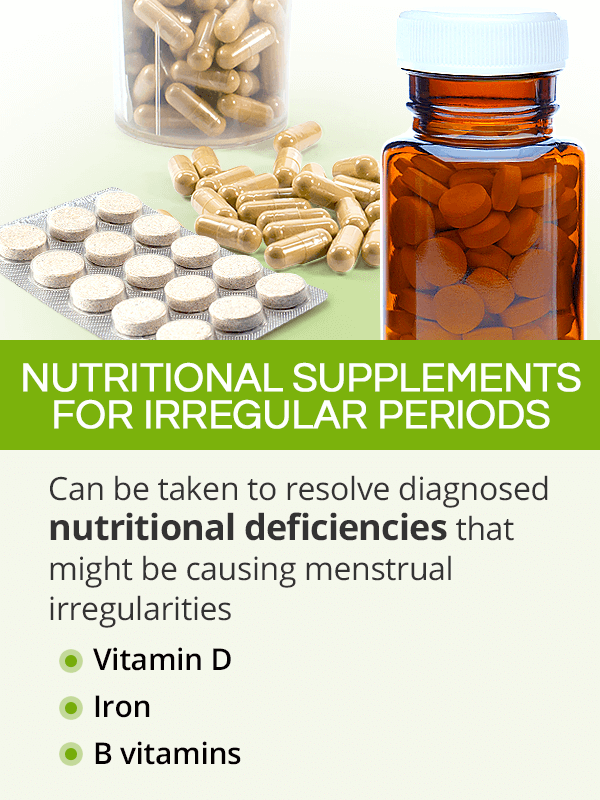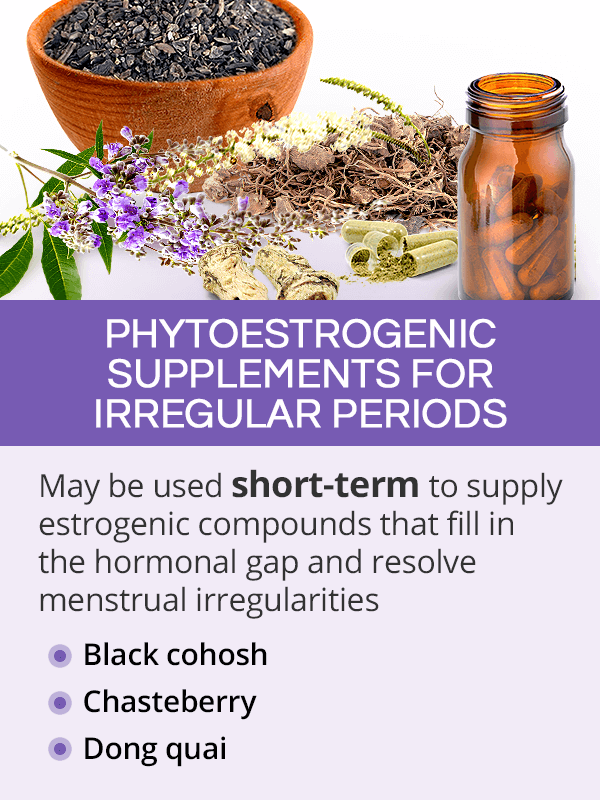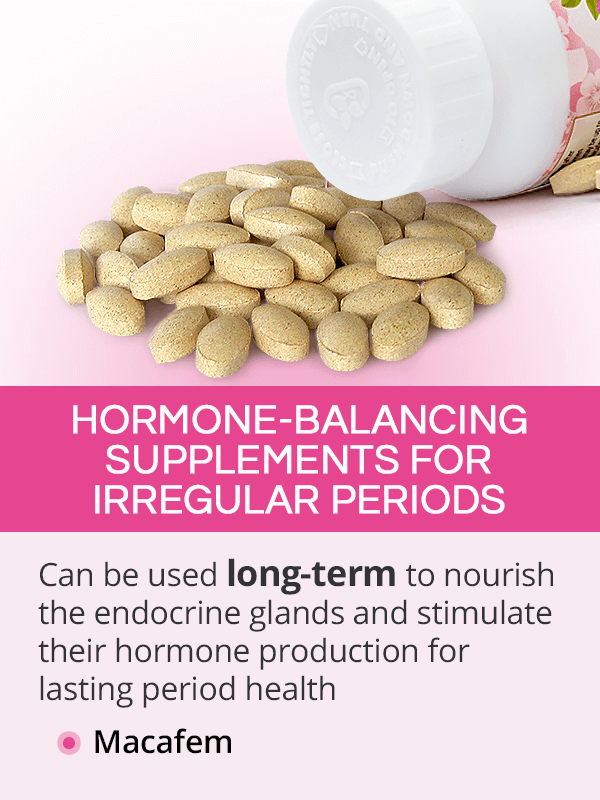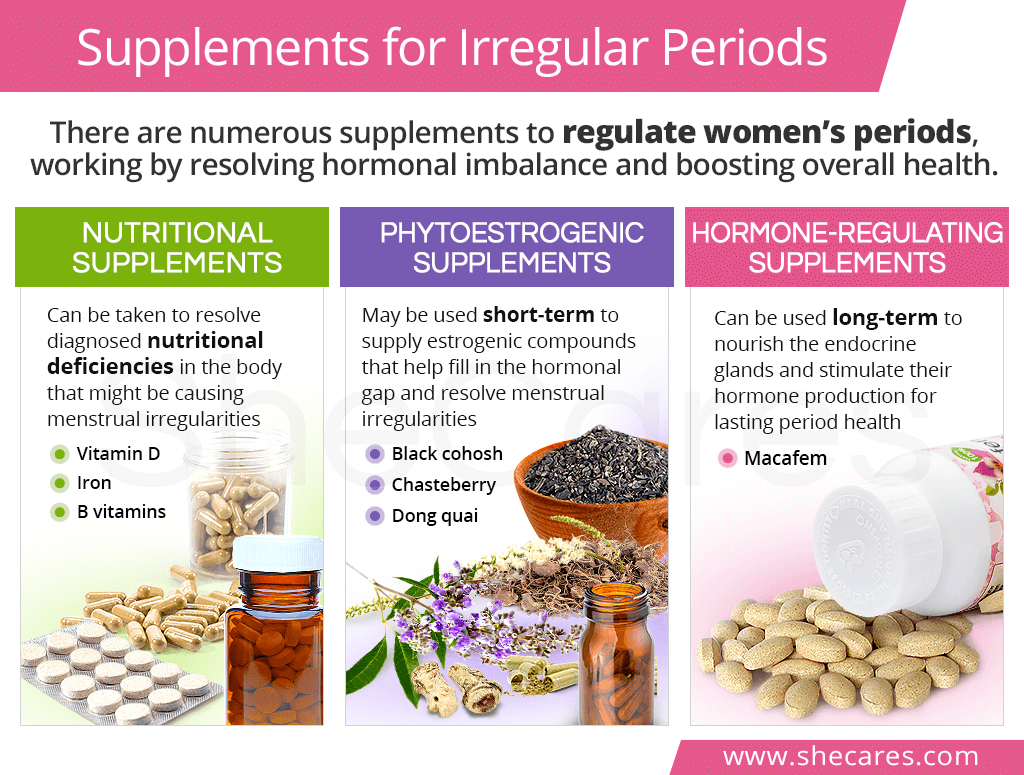Nutritional Supplements for Irregular Periods

Irregular periods - including lack of periods, or amenorrhea - might be caused by nutritional lacks, especially those resulting from a poor diet and other unhealthy habits.
Alongside a balanced diet, women with diagnosed deficiencies might need nutritional supplements containing various minerals and vitamins to regulate their periods. They may include the following:
Iron deficiency can lead to the development of anemia, which, in turn, may cause period irregularities.1
Vitamin D deficiency has been associated with irregular periods and abnormal ovulatory function.2
Calcium has been shown to resolve menstrual abnormalities due to polycystic ovary syndrome (PCOS), more effectively when taken together with vitamin D and metformin therapy.3
B vitamins - particularly thiamine, riboflavin, and folic acid - have been found beneficial for regulating periods as well as lowering the risk of premenstrual syndrome (PMS).4
Magnesium is needed for the production of steroid hormones, which guide the menstrual cycle.5 Taken with vitamin B6, magnesium can lead to significant improvements in resolving period irregularities.6
Phytoestrogenic Supplements for Irregular Periods

Phytoestrogenic supplements are made with a type of herbs to regulate periods that contain compounds called phytoestrogens. They exert estrogenic effects on the body, thus balancing hormone levels and relieving symptoms.
By doing that, they fill in the hormonal gap and help bring hormone levels to normal, thus promoting menstrual regularity and reproductive health. Women can choose from the following options:
Chasteberry has been scientifically shown beneficial for treating irregular periods, PMS, infertility, and other hormone-related ailments.7
Dong quai has been found effective for regulating menstrual patterns, reducing painful periods, and relieving PMS symtpoms.8
Black cohosh is most commonly used for women with menopause symptoms, but it can also help improve women's reproductive health and contribute to regulating periods.9
Because phytoestrogenic supplements supply the body with external hormones, they can make the body less capable of producing its own hormones. This may result in further decline of hormone levels and deregulation of the cycles. As such, they are best used short-term.
Hormone-Balancing Supplements for Irregular Periods

Hormone-regulating supplements contain another type of herbs for irregular periods. They nourish the endocrine system - specifically, the thyroid and pituitary glands - with beneficial alkaloids and stimulate them to optimize their own production of hormones.10
As a result, hormone-balancing supplements, like Macafem, regulate period patterns, improve ovulation, and alleviate symptoms, like menstrual cramps. They can also improve fertility in women trying to get pregnant.
Because they work directly on the endocrine glands without supplying the body with outside hormones, they virtually cause little to no side effects. As such, they are considered some of the safest and most effective herbal supplements for irregular periods and can be used long-term for lasting menstrual health.
Key Takeaways
Supplements for irregular periods are valid options for women wishing to resolve abnormalities and restore menstrual health. Since most causes of abnormal periods directly or indirectly relate to hormonal imbalance, the options from which women can choose revolve around balancing hormone levels and regulating their cycles. Dietary supplements containing minerals and vitamins to regulate periods, like iron or B vitamins, are an option for women whose period issues are due to nutritional deficiencies. Another option is phytoestrogenic supplements made with herbs for irregular periods, like chasteberry or dong quai, which can be used for short-term relief from menstrual irregularities. Last but not least, hormone-balancing supplements, like Macafem Healthy Periods, aim at nourishing the endocrine glands to regulate their hormone production, thus promoting long-term menstrual health. So, next time you speak with your doctor about your menstrual health, consider the use of supplements for irregular periods for the long-lasting relief you deserve.
Sources
- American Journal of Epidemiology. (2013). Intake of Selected Minerals and Risks of Premenstrual Syndrome. Retrieved April 2, 2020 from https://www.ncbi.nlm.nih.gov/pmc/articles/PMC3649635/
- Annals of Epidemiology. (2016). Folic acid supplement use and menstrual cycle characteristics: a cross-sectional study of Danish pregnancy planners. Retrieved April 2, 2020 from https://www.ncbi.nlm.nih.gov/pmc/articles/PMC4567938/
- Epidemiology. (2017). Vitamin D and Risk of Uterine Fibroids. Retrieved April 2, 2020 from https://www.ncbi.nlm.nih.gov/pmc/articles/PMC5330388/
- Fertility and Sterility. (2008). Use of multivitamins, intake of B vitamins and risk of ovulatory infertility. Retrieved April 2, 2020 from https://www.ncbi.nlm.nih.gov/pmc/articles/PMC2366795/
- Nutrients. (2018). The relationship between vitamin D status and the menstrual cycle in young women: a preliminary study. Retrieved April 2, 2020 from https://www.ncbi.nlm.nih.gov/pmc/articles/PMC6265788/
- Obstetrics & Gynecology Science. (2019). Comparison of the effect of vitamin E, vitamin D and ginger on the severity of primary dysmenorrhea: a single-blind clinical trial. Retrieved April 2, 2020 from https://www.ncbi.nlm.nih.gov/pmc/articles/PMC6856484/
Footnotes:
- BioMed Research International. (2013). Association of Iron Depletion with Menstruation and Dietary Intake Indices in Pubertal Girls: The Healthy Growth Stud. Retrieved Abril 2, 2020 from https://www.ncbi.nlm.nih.gov/pmc/articles/PMC3885188/
- Reproductive Biology and Endocrinology. (2015). Lower plasma 25-hydroxyvitamin D is associated with irregular menstrual cycles in a cross-sectional study. Retrieved April 2, 2020 from https://www.ncbi.nlm.nih.gov/pmc/articles/PMC4359493/
- Journal of Research in Medical Sciences. (2014). The effect of calcium and vitamin D supplementation on menstrual cycle, body mass index and hyperandrogenism state of women with polycystic ovarian syndrome. Retrieved April 2, 2020 from https://www.ncbi.nlm.nih.gov/pmc/articles/PMC4268197/
- Health Promotion Perspectives. (2015). The Association between the Risk of Premenstrual Syndrome and Vitamin D, Calcium, and Magnesium Status among University Students: A Case control Study. Retrieved Abril 2, 2020 from https://www.ncbi.nlm.nih.gov/pmc/articles/PMC4667262/
- The American Journal of Clinical Nutrition. (2011). Dietary B vitamin intake and incident premenstrual syndrome. Retrieved Abril 2, 2020 from https://www.ncbi.nlm.nih.gov/pmc/articles/PMC3076657/
- Iranian Journal of Nursing and Midwifery Research. (2010). Evaluating the effect of magnesium and magnesium plus vitamin B6 supplement on the severity of premenstrual syndrome. Retrieved April 2, 2020 from https://www.ncbi.nlm.nih.gov/pmc/articles/PMC3208934/
- Journal of Midwifery Women's Health. (2006). The use of herbs and dietary supplements in gynecology: an evidence-based review. Retrieved April 2, 2020 from https://www.ncbi.nlm.nih.gov/pubmed/17081929
- European Medicines Agency. (2013). Assessment report on Angelica sinensis (Oliv.) Diels, radix. Retrieved April 2, 2020 from https://www.ema.europa.eu/en/documents/herbal-report/final-assessment-report-angelica-sinensis-oliv-diels-radix-first-version_en.pdf
- Romm, A. (2017). Botanical Medicine for Women's Health. Retrieved April 2, 2020 from https://www.elsevier.com/books/botanical-medicine-for-womens-health/romm/978-0-7020-6193-6
- International Journal of Biomedical Science. (2006). Hormone-Balancing Effect of Pre-Gelatinized Organic Maca (Lepidium peruvianum Chacon): (I) Biochemical and Pharmacodynamic Study on Maca using Clinical Laboratory Model on Ovariectomized Rats. Retrieved April 2, 2020 from https://www.ncbi.nlm.nih.gov/pmc/articles/PMC3614604/
